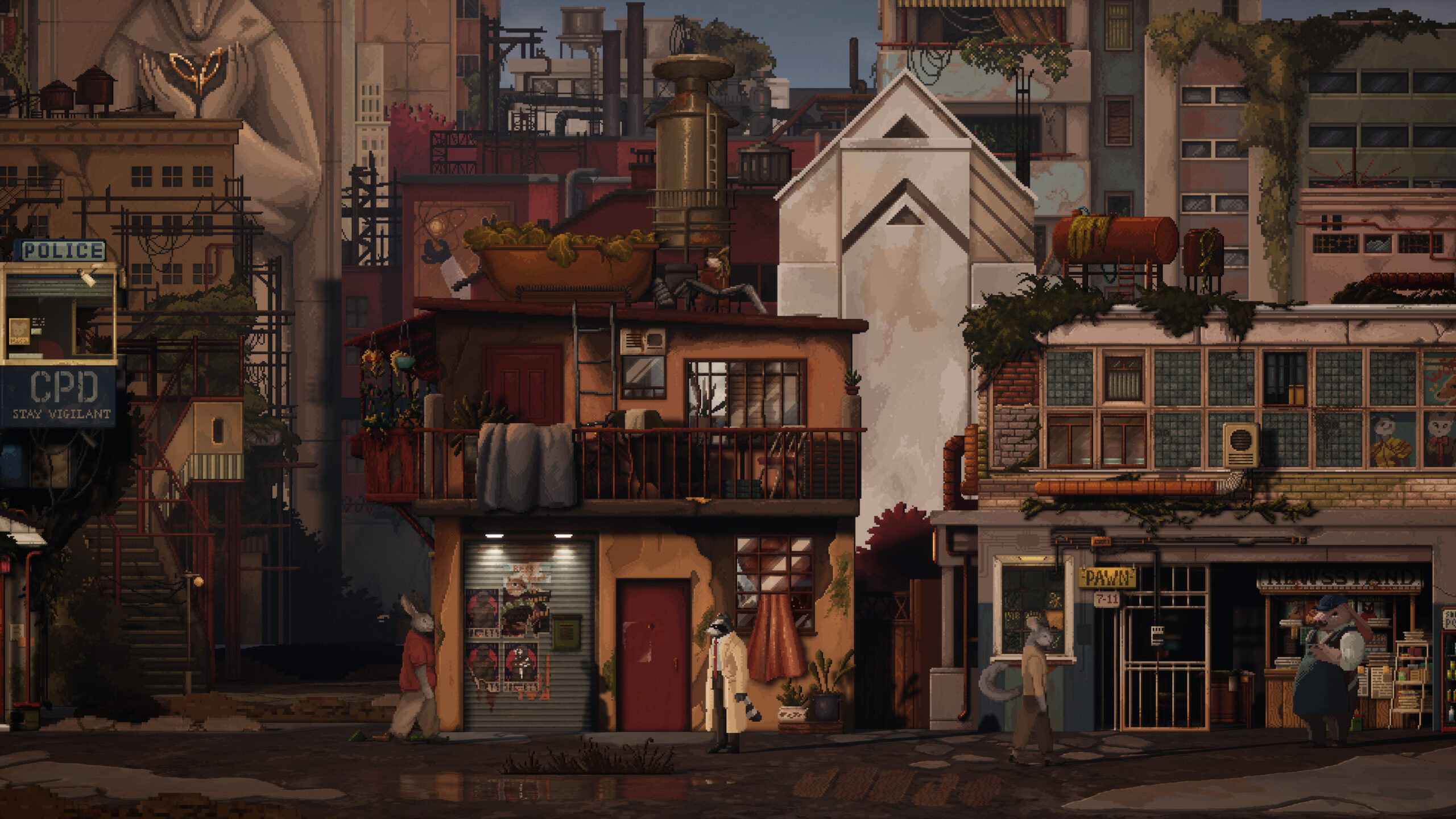Backbone Review
I want to sum up my review for Backbone by EggNut really quickly: if you’re interested in noir detective stories that take a left field turn, and end up drifting from Ellroy and Chandler to Huxley, Kafka and Dick, then I recommend you play this without reading anything more. It’s a gorgeous game that caught me unaware, and if you like weird fiction, you’ll probably enjoy Backbone a lot.
For a more in-depth review, here’s the skinny: Backbone is a detective game set in a version of Vancouver B.C populated entirely by anthropomorphic animals. You play a racoon who is a PI. He is called Howard Lotor (funny see, cos P. Lotor is the species name for a common raccoon). You start off working a case. Missing guy. Dame is quiet, terse. You reckon it’s adultery. Reckon he’s violent, unhinged. Gonna get some pictures, confirm the worst. Wife reckons he’s hanging out at The Bite, fancy new joint in Granville.
From here, you end up in the sway of the game. Over five chapters, you’ll point, click, and chat your way through a series of lush pixel art environments, filled with animal approximations of popular noir characters. Wise-ass wolves, skittery drug-peddling squirrels, devious foxes, playful cats and rabbits. They’re described by their species, or their “Kind”, and every Kind has its own social standing and job. The dystopia of Backbone initially makes itself known on the edges, like paper curling up as it rots in the damp, or as a scorching fire licking its edges.
Unsavoury types

Before long you’re embroiled in a conspiracy: working for a woman named Renee who wants to tear the whole corrupt establishment down. It’s a scene you’ve seen played out a thousand times before in detective fiction, until, pretty suddenly, it isn’t. When you’ve read a bunch of books, watched a host of films, and played a cadre of games, you’ll begin to recognise that every genre is built upon a specific set of tropes—and occasionally, a self-aware tale would subvert these with clever nods and winks that bring attention to the sometimes formulaic signifiers of these genres.
Backbone is one such tale, performing all of these artfully. It could have been a real slam dunk of a noir detective game. Even with that suspicious little dystopia call-out in its description, it could have just teased the edges. It’s a credit to the writers that it doesn’t do just this haphazardly, but instead takes a thread and pulls it until the story unravels.
One sequence in particular stands out, soundtracked by the game’s apocalyptic doom jazz soundtrack which growls and reverberates through distortion and rusted machine hums. You walk along a mainstreet, shortly after an interrogation goes wrong, and there’s a parade taking place. It’s raining, and everything feels hazy and wrong: the screen warps and distorts, and your vision starts to change. In a noir world full of drugs and liquor, you’ll have already had your grasp on reality rocked at this point, so perhaps it’s par for the course.
But this time it’s different. This blight is shadowy, dark—the city is rotten right down to the bitumen, there’s a distinct whiff of J.G. Ballard as insect legs creep out of the shadows, and are thrown into sharp relief by the lights of the city.
Twists and turns

My lips are sealed. Backbone ends up going places I didn’t expect it to go, and it’s thrilling. I don’t know if I have a real grasp on the game’s themes: of the tenuous nature of inherited power, of the forces of change in the world often being invasive, alien to those that witness them, of the raw and emotional desire for everyone to fight injustice. There’s meat to get your teeth into here, in more ways than one.
It’s probably worth noting that, gameplay wise, this is bread and butter text adventure stuff, but it doesn’t matter. In terms of presentation, Backbone has it all: snappy writing, environments dripping with detail—every frame a painting—and an incredible, portentous soundtrack. It’s not long, and is probably a short novel’s worth of blood, grit and weirdness. But it’s not perfect either; there are a few conversations that feel like they spiral pointlessly without obvious exits, and conversation trees outstay their welcome, but also guilts you against hopping off early, which becomes especially apparent during a tense conversation with the mother of a missing girl. There are also some awkwardly spaced save points—at one point I had to step away, and when I came back I had to redo a good ten minutes at the start of Chapter Three. These rough edges grate more than they should.
The ending left me with lots of questions, and I don’t invoke the names of Beckett and Kafka and Ballard lightly. I guess Lynch can go here too, as well as more modern writers like Atword, Ligotti, Butler, and Vandermeer: Backbone touches on the sort of existential uncertainty that these writers famously imbued their work with. It also made me think about the forces that push back against people’s herculean efforts to better their circumstances: be they inculcated beliefs from society, or perhaps even things that are more primordial than that. That’s perhaps the best praise I can give this game: that it’s going to sit festering in the back of my mind for a good long while.

